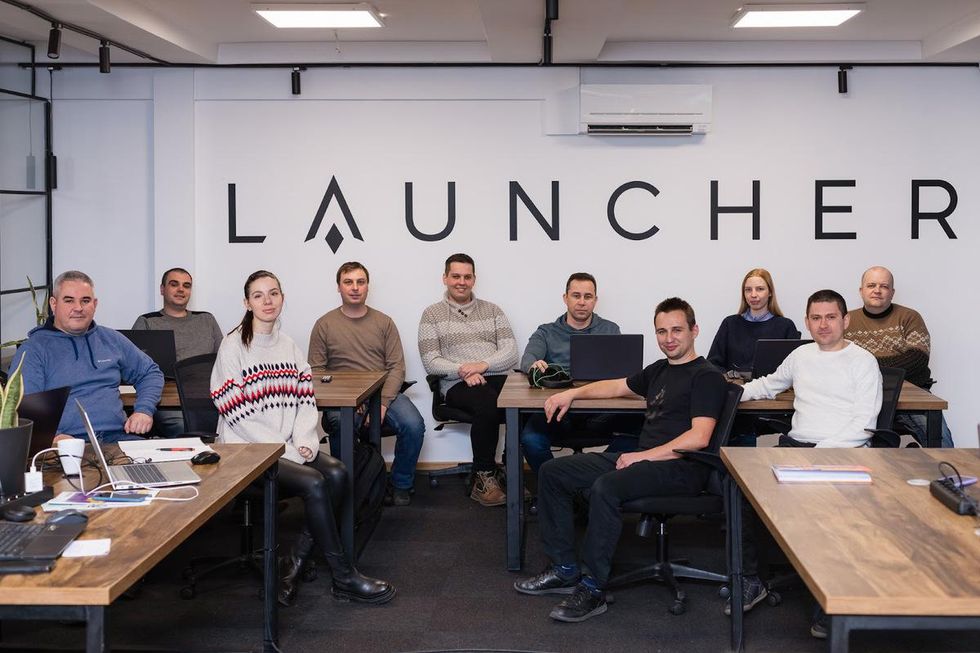'I Just Want To Save a Life’: For LA Startups With Tech Staff in Ukraine, the War Hits Close to Home

Sign up for dot.LA's daily newsletter for the latest news on Southern California's tech, startup and venture capital scene.
The invasion of Ukraine by Russia may be taking place more than 6,000 miles from California—but for some in Los Angeles’ tech and startup world who rely on Ukraine’s deep pool of tech talent, the conflict is hitting close to home.
Over the past week, some L.A.-based startups have found themselves trading phone calls, text messages and emails with their Ukrainian contractors, many of whom are huddled underground in subways seeking refuge from Russian attacks. Some have heeded their country’s call to arm, picked up rifles and joined the war effort.
“I want to keep the company going,” Petro Kovalchuk, founder and CEO of Lviv-based software development company Lvivity, told dot.LA in a video conferencing call from the western Ukraine city over the weekend. “My job for the company is to save [its 50 employees] and keep their families in a safe place.”
 Petro Kovalchuk, CEO and founder of software development company Lvivity.
Petro Kovalchuk, CEO and founder of software development company Lvivity.Image courtesy of Lvivity
Kovalchuk said Lvivity works with several startups in the L.A. region—none of whom he identified, citing confidential non-disclosure agreements about the work it performs. While Russian forces have yet to attack Lviv, the 33-year-old founder said he has rushed for shelter in his apartment building’s underground parking garage amid occasional air raid sirens and the sound of explosions in the distance.
“Just support us—we don’t need NATO, or your people here,” said Kovalchuk. As a member of Ukraine’s military reserves, Kovalchuk said he’s already been called up for service, though he doesn’t yet know where he’ll be deployed. “We are able to fight like Ukrainian spartans.”
In interviews, executives of L.A. tech companies who contract out work to Ukraine spoke of the stress and panic they have felt while scrambling to help those workers get out of the besieged country.
“I’m pretty stressed; I slept three hours last night,” Timothy Li, CEO of Irvine-based lending platform Alchemy Technologies, told dot.LA on Sunday. He said roughly two dozen of Alchemy’s contractors in the eastern Ukrainian city of Kharkiv were hunkered down in subways to escape Russia’s onslaught.
One of Alchemy’s workers, according to Li, has a family member who delivered a baby in the subway on Saturday evening. Li said he’s been communicating with the workers via the Telegram messaging app and is trying to send them money to help pay for food and escape to neighboring Poland.
Alchemy’s staff in Kharkiv includes software experts, engineers, graphic designers, quality assurance engineers and sales project leaders. “Even my personal assistant is there,” Li noted. “I’m not at work anymore. I just want to save a life.”
While far from his primary concern, Li said the conflict has forced Alchemy, which is currently raising a $25 million Series A funding round, to adjust its operations. “Everyone here is taking on the additional workload,” he said. “This is horrible. This isn’t even about work; this is about basic humanity.”
U.S. firms have increasingly tapped Ukraine’s skilled tech workforce for services in recent years—drawn both by difficulties in finding the tech talent they need stateside and by lower labor costs abroad. As the situation in Ukraine escalates, local Ukrainian community leaders are lobbying for an expansion of the U.S.’s H-1B visa program that would allow U.S. employers to accommodate those forced to flee the country.
Multiple L.A.-based tech companies reached by dot.LA for this article declined to comment on their operations in Ukraine, citing fears of retaliation to both their workers in the country and through cyberattacks targeting their own businesses.

In a public note last week, Max Haot, founder and CEO of Hawthorne-based aerospace startup Launcher, said the company was “providing all of the necessary support we can think of to our team, partners, and their families and communities in Ukraine.” Launcher, which is developing rockets to deliver small satellites into orbit, has a subsidiary office in the central Ukraine city of Dnipro, once a center for the Soviet aerospace and defense industries.
As tensions between Ukraine and Russia gradually escalated in the weeks leading up to the invasion, Launcher managed to relocate its Dnipro staff and their families to a new office in Sofia, Bulgaria and paid for their relocation expenses, Haot said. (Six members of its 16-person team in Ukraine decided to stay in the country, he added.) Haot noted that one of his previous startups, Livestream, had pursued similar measures in 2014—relocating its Ukraine team members to Montenegro after war broke out with Russia.
Yet another L.A. entrepreneur who has expressed concern for their tech staff in Ukraine is Spencer Rascoff. The Zillow co-founder, who now leads venture capital firm 75 & Sunny, said last week that one of his startups, Recon Food, relies on a software development team in Kiev. (Disclosure: Rascoff is the co-founder and chairman of dot.LA.)
“They are great people and have been terrific partners,” Rascoff wrote on Twitter. “Hoping for the best for these friends.”
- Ukraine-Russia Conflict Should Give TikTok Cause for Concern - dot ... ›
- LA's Ukrainian Community Leaders Seek More Visas for Tech ... ›
- Ukraine-Russia Conflict Should Give TikTok Cause for Concern - dot.LA ›
- Ukraine-Russia Conflict Should Give TikTok Cause for Concern - dot.LA ›



 Image Source: Skyryse
Image Source: Skyryse
 Image Source: Northwood Space
Image Source: Northwood Space